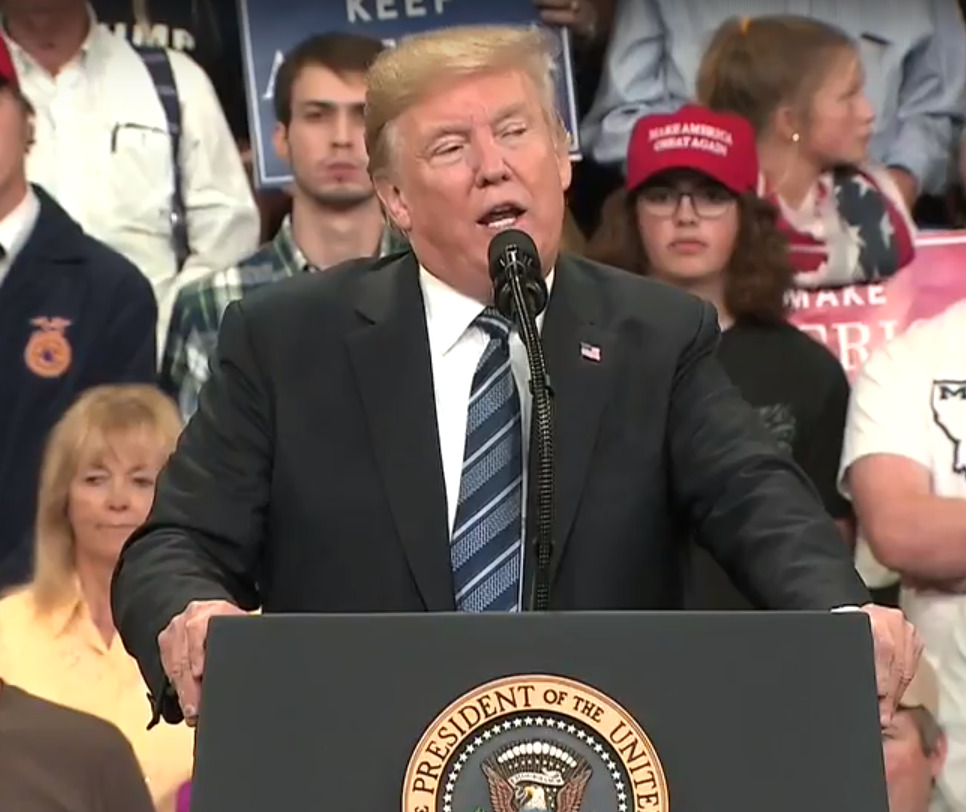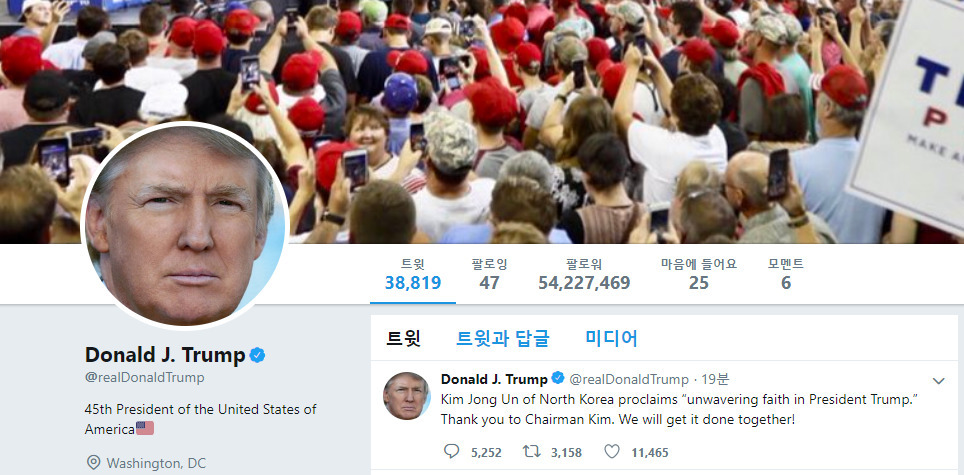Posted on : Sep.8,2018 15:07 KST
Modified on : Sep.8,2018 15:12 KST
 |
|
US President Donald Trump speaks at a Republican Party rally in Billings, Montana, on Sept. 6. (YouTube screenshot)
|
Trump reaffirms coziness with Kim while indicating no need to rush
American officials have remained low-key about the outcome of the special envoy delegation that South Korean President Moon Jae-in sent to North Korea on Sept. 5 while declining to provide a concrete assessment.
Considering that the ball is now in the US’s court after North Korea proposed a denuclearization timeframe of US President Donald Trump’s first term in office (running through Jan. 2021), Korean Peninsula experts in the US expect that the US will decide on the direction of its North Korean policy after the third inter-Korean summit, scheduled for Sept. 18 to 20, and the South Korea-US summit at the end of this month.
One diplomatic source in Washington, DC, reported on Sept. 6 that the mood in the US government “doesn’t seem bad” at the moment. Soon after the special delegation announced the results of its trip to North Korea on Sept. 6, Trump tweeted, “Thank you to Chairman Kim. We will get it done together!”
And then during a rally for the Republican Party that was held in the state of Montana on the evening of Sept. 6, Trump said it was “good” that North Korea had promised to finish denuclearization before the end of his first term in office: “I respect [Kim Jong-un], and he respects me. And I think something is going to happen. Take your time [for denuclearization]. [. . .] Sanctions are on.”
Trump’s remarks appear to mean that there’s no reason to rush the negotiations given the personal trust he has with Kim. He once again underlined his coziness with Kim while expressing his commitment to dialogue.
But other high-ranking officials in the US State Department offered a more measured response. While in India, US Secretary of State Mike Pompeo declined to comment about the talks underway with North Korea and said there’s a lot of work to do. White House National Security Advisor John Bolton announced on Twitter that he had spoken on the phone with Blue House National Security Office Director Chung Eui-yong but only said they had “agreed to stay in touch in advance” of Moon’s upcoming summits with Kim and Trump.
The office of the spokesperson of the State Department also emphasized denuclearization to the Hankyoreh, noting that the world had its eyes on the denuclearization that Kim Jong-un had promised and expressed confidence that the promise made by Trump and Kim would be kept.
 |
|
Trump’s Sept. 6 tweet thanking North Korean leader Kim Jong-un for his “unwavering faith.”
|
Possible for reasons for US government’s caution
The apparent reason the US government’s reaction has generally been so cautious is because the message that North Korea communicated through the special envoy delegation is complicated. The timeframe for denuclearization laid out by Kim puts some meat on the bones of his commitment to denuclearization and accords with Trump’s desire to use progress on denuclearization on the Korean Peninsula to help him get reelected.
Furthermore, Kim’s statement that the end-of-war declaration has nothing to do with forcing the withdrawal of American troops from the Korean Peninsula or weakening the US’s alliance with South Korea is significant in that it reduces some of the pressure on the US.
But whereas the US has been asking North Korea to submit a list of its nuclear weapons and facilities, Kim once again brought up the detonation of the nuclear test site at Punggye Village and the closure of the missile test launch site at Tongchang Village and called on the US to take the “corresponding actions” – namely, making an end-of-war declaration. This didn’t resolve the tense showdown over what should come first -- the disclosure of nuclear facilities or the end-of-war declaration. Furthermore, the US isn’t eager to accept the principle of “simultaneous action” that Kim advocates.
While Korean Peninsula experts in the US who spoke with the Hankyoreh were generally positive about the results of the special delegation’s visit to North Korea, they were more cautious about the prospects of future North Korea-US negotiations.
“This was positive overall since it succeeded at maintaining the momentum not only in inter-Korean relations but also in North Korea-US relations. Trump will try to arrange another visit to North Korea by Pompeo before the midterm elections in November to demonstrate that his North Korean policy is a success,” said John Feffer, director of Foreign Policy in Focus.
Jung H. Pak, a senior fellow at the Brookings Institution, focused on the fact that Kim had expressed his “unchanging trust” in Trump: “Kim believes that the window of opportunity could be shut by Trump’s situation at home and is trying to crank up his charm offensive to achieve a peace declaration.”
Likelihood of Pompeo visiting North Korea again
Frank Aum, a senior analyst at the United States Institute of Peace, thought that the results of the special envoy delegation’s visit to North Korea were “encouraging and helpful.” But he pointed out the lack of any major steps toward denuclearization, such as disclosing nuclear facilities or materials or freezing production, and said that “this isn’t enough for Pompeo to visit North Korea again.”
“It’s important for Moon Jae-in to gain some major concessions from North Korea during the inter-Korean summit this month. That’s the only way it would be possible for Pompeo to make a fourth trip to North Korea and for a second North Korea-US summit to be held.”
“Since the US wants South Korea’s help on North Korea’s denuclearization, it’s good news that [North Korea] has recognized denuclearization as a topic for inter-Korean dialogue,” said Scott Snyder, a senior fellow at the Council on Foreign Relations, who emphasized cooperation between South Korea and the US on denuclearization.
“South Korea and the US need to work together closely to ensure that South Korea’s request for exemptions of sanctions on North Korea for inter-Korean cooperation will not weaken the key leverage [sanctions] for the North’s denuclearization,” he added.
Given these trends in the US, the US appears likely to decide on the direction of negotiations with the North after confirming the North’s true intentions through the third inter-Korean summit and the South Korea-US summit that will take place shortly thereafter during the UN General Assembly. Moon’s role has basically grown in importance, since he must persuade both Kim and Trump to make a bold decision. Until that happens, Pompeo’s fourth trip to North Korea, which was cancelled at the end of August, is unlikely to be rescheduled, these experts predict.
By Hwang Joon-bum, Washington correspondent
Please direct comments or questions to [english@hani.co.kr]










